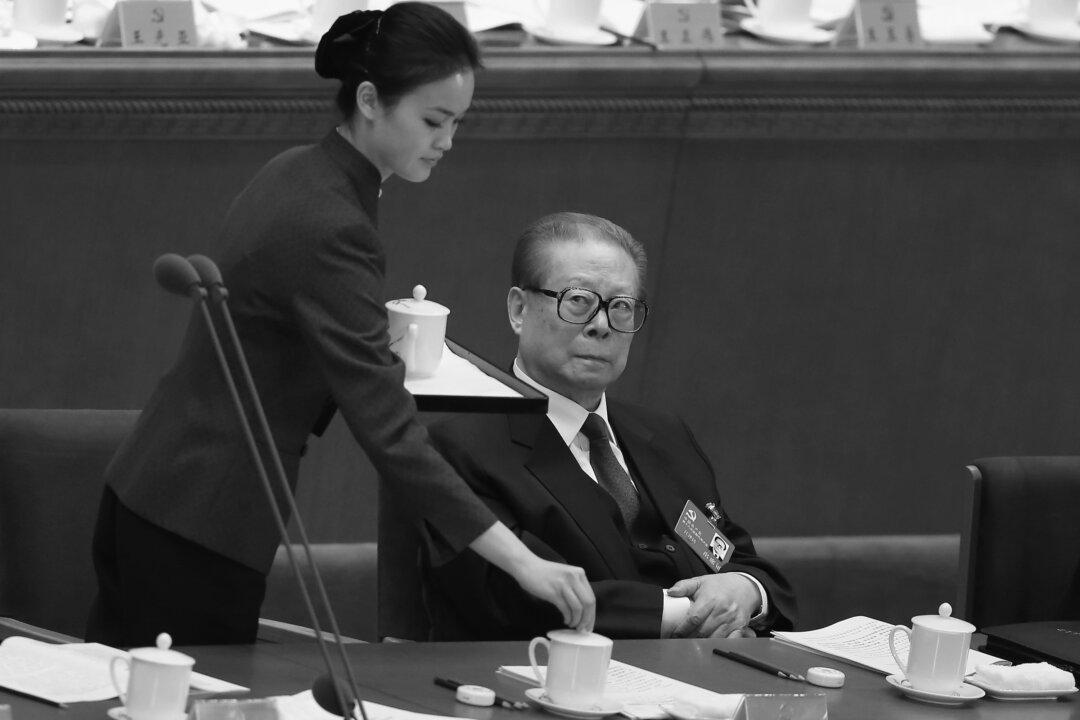The abrupt resignation of a veteran anchor at the official broadcaster China Central Television quickly became an occasion for Chinese Internet users to engage in a favorite past time: cracking wise about the private life of former Party leader Jiang Zemin.
Jiang was head of the Communist Party from 1989 until 2002, and retained influence at the highest levels of the regime for another decade, until at least the end of 2012. While in and out of power, Jiang was well-known for his penchant to demand positive media coverage.
But the image he attracted, too, was one of a tawdry womanizer. The 53-year-old Li Ruiying, host of CCTV’s daily news program News Simulcast, or Xinwen Lianbo in Chinese, the most watched in China, was widely reputed to be one of his conquests. When she unexpectedly left her position in May after being host of the program for 30 years, speculation and rumor-mongering on the Internet took off.
“The toad’s mistress has been laid off,” said Yusa Jiangtian, an Internet user, writing on the popular social media platform Weibo, using a common epithet for Jiang’s ranine features. Many similar comments were made under the news item, referring to Li as Jiang’s mistress.
Typically, pejorative remarks on the Internet about former and current Chinese communist leaders are deleted by Internet censors. These remarks, however, were not, raising the possibility that the lapse was deliberate, given the well-known and ongoing strife between the interests of Jiang Zemin and that of the new leadership.
Jiang was not only the most powerful man in China for many years, but also worked hard to ensure that his influence in the Communist Party extended well beyond his term in office. Xi Jinping, the Party leader since November 2012, has over the last 18 months made significant efforts to uproot many of Jiang’s loyalists. Most notably this includes Zhou Yongkang, the former security czar, whom Jiang installed in the Politburo Standing Committee, the Party’s nerve center, so that he would continue to prosecute Jiang’s bitter campaign against the Falun Gong spiritual practice.
Along with the talk of Jiang’s CCTV mistress, old photographs that mock Jiang have been dredged up. These relate to the son of Song Zuying, widely held to be another of Jiang’s mistresses. A photograph, titled “Song Zuying’s 7 year-old son,” was an object of amusement for Internet users, who drew parallels between the facial characteristics of the young child and Jiang Zemin.
The photograph shows a grinning child wearing large black-rimmed glasses, as Jiang does. “Now I truly know who his father is,” said one commenter. “They are so alike. I can’t stop imagining,” said another. “He looks so like him!” remarked yet another. Other Internet users made much less friendly comments about the child.
As with the snide remarks about Jiang’s alleged mistress at CCTV, these comments also appeared to be left untouched.
“The authorities didn’t organize this criticism, but it seems they’ve organized not to delete it,” said Shi Cangshan, an analyst of Party affairs based in Washington, D.C.
Shi added that many officials among Xi Jinping’s ruling clique carry an abiding resentment toward Jiang Zemin. “The leftists hate Jiang because they think he turned China too capitalist; and many princelings hate him because they think their fathers gained power through war, but they didn’t get rich. Meanwhile, Jiang and his group became billionaires through corruption during the economic reform process.”
The ferocity of the Xi regime’s attack on corruption may also be related to these sentiments, Shi said.
Since the end of 2012, over 440 cadres at different levels have been investigated or expelled from the Party due to corruption, according to the Central Commission for Discipline Inspection, the Party’s anti-corruption watchdog.
A significant number of the high-level officials who have been purged were allies of Jiang Zemin. These include, most recently, Su Rong, former vice-chairman of the Chinese People’s Political Consultative Conference, and the highest-ranking official to be formally purged in Xi Jinping’s anti-corruption campaign.
Zhou Yongkang, the former security chief, was also a longtime confidant and protege of Jiang Zemin. Zhou Yongkang became one of the de facto most powerful men in China due to his monopoly of the regime’s entire security system, a sprawling apparatus with a budget that approached that of the military for many years.
Zhou’s tentacles in the petroleum industry, the province of Sichuan and Liaoning, and in the security services, have all been severed by Xi Jinping’s anti-corruption investigators.
With reporting by Matthew Robertson




